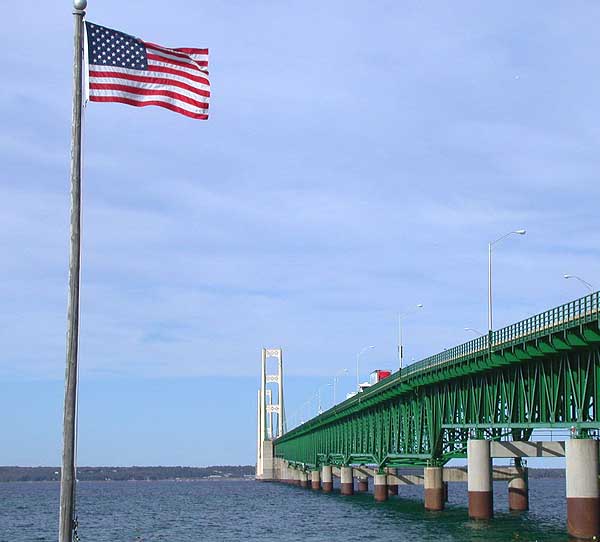Michigan Gov. Gretchen Whitmer is doubling-down on her efforts to shut down a key oil and natural gas liquids pipeline running between Superior, Wisconsin and Sarnia, Ontario.
Enbridge’s Line 5 pipeline traverses parts of northern Wisconsin, Michigan’s Upper Peninsula, and the 4.5-mile-long floor of the Straights of Mackinac connecting Lakes Michigan and Lake Huron. Line 5 has for nearly 70 years safely transported hydrocarbons from western Canada to markets in the Great Lakes region of the United States.
Line 5 moves more than a half a million barrels of oil and natural gas liquids a day throughout the Great Lakes region.
Shutdown or Not
Whitmer ordered Line 5’s twin pipelines to shut down in 2020, saying they pose a grave threat to the Great Lakes because of the possibility of oil spills.
Enbridge, the Calgary-based company that operates the pipeline, refused, saying Whitmer lacked the legal authority to unilaterally order the closure of the pipeline which is involved in interstate and international commerce.
Canada asked the Biden administration to intervene and overrule Whitmer, invoking a dispute-resolution article of a 1977 treaty governing pipelines between it and the United States.
In a letter to U.S. District Judge for Western Michigan Janet Neff, Gordon Griffin, a lawyer representing the Canadian government, cited an article in the treaty which states: “No public authority in the territory of either Party shall institute any measures … which are intended to, or which have the effect of, impeding, diverting, redirecting, or interfering with in any way the transmission of hydrocarbons in transit.”
Whitmer Remains Defiant
Whitmer pointed to a 2010 incident at a separate Enbridge pipeline that ruptured in southwestern Michigan to support her claim that Line 5 pipeline should be permanently closed because it threatens the Great Lakes’ unique environmental amenities.
“So long as oil is flowing through the pipelines, there is a very real threat of a catastrophic oil spill in the Great Lakes,” said Whitmer in a statement. “I have made clear to Enbridge that is cannot use our state-owned lakebed for these pipelines, but Enbridge has refused to stop. “Moreover, rather than taking steps to diversify energy supply and ensure resilience, Canada has channeled its efforts into defending an oil company with an abysmal environmental track record,” Whitmer said.
Enbridge paid a stiff fine for the 2010 incident and remediated the affected area.
In a 2021 analysis of the pipeline, the U.S. Pipeline and Hazardous Materials Safety Administration, the federal agency responsible for overseeing Line 5, said it is “presently aware of no unsafe or hazardous conditions that would warrant shutdown of Line 5.”
The bilateral dispute is playing out in the wake of the Biden administration’s cancellation earlier this year of the Keystone XL pipeline, which would have brought crude oil from northeastern Alberta to refineries on the U.S. Gulf Coast.
That move cost thousands of jobs in both countries and brought a public rebuke protest from the Canadian government to the then newly installed Biden administration.
“A Green Political Stunt”
Pipelines are regulated by the federal government, including the right of eminent domain, for good reason, because the Constitution delegates to Congress the sole authority to regulation interstate commerce,” says David Wojick, Ph.D., an independent energy analyst who often writes for the Committee for a Constructive Tomorrow (CFACT), co-publisher of Environment & Climate News.
“Pipelines are the embodiment of interstate commerce, often passing through several states in order to serve many,” Wojick said. “In this case, the pipeline is not just interstate; it is international.
“We work closely with Canada; for instance, cars are manufactured in Sarnia for the U.S. market,” said Wojick. “Michigan’s action is nothing more than a green political stunt.”
Policies Contradict Stated Goals
The efforts by Whitmer and the Biden administration to shut down pipelines and end oil and gas use undermine their stated goals of creating jobs and growing the economy, says Jason Hayes, director of environmental policy at Michigan’s Mackinac Center for Public Policy.
“Both the Whitmer and the Biden administrations appear confused,” said Hayes. “Biden claims he wants to ‘build back better,’ and Whitmer, through her ‘MI New Economy Plan’ claims she wants to grow Michigan’s middle class and support its small businesses, but their energy policies are doing the exact opposite.
“Biden cancelled the Keystone XL pipeline in his first days in office and his administration has chosen to remain on the sidelines as Whitmer’s crusade against Line 5 threatens to spike energy prices and actually harms our relationship with Canada, America’s largest trading partner,” Hayes said.
Whitmer and Biden have options that are better for the environment and the economy, says Hayes.
“This is all so unnecessary, because both Biden and Whitmer could focus their administrations on building the Line 5 tunnel,” said Hayes. “Doing this would better protect the waterways of the Great Lakes and maintain an essential piece of the nation’s energy infrastructure.
“Instead, Whitmer appears blindly committed to raising energy prices and putting tens of thousands of Midwesterners out of work, and, for his part, Biden appears content to go on bended knee to Vladimir Putin and the leaders of OPEC asking them to act to bring more oil supplies to the market as he simultaneously squeezes the life out of the American oil and gas industry,” Hayes said.
Bonner R. Cohen, Ph.D., (bcohen@nationalcenter.org) is a senior fellow at the National Center for Public Policy Research and a senior policy analyst with CFACT.



























Whitmer is witless and a twit.